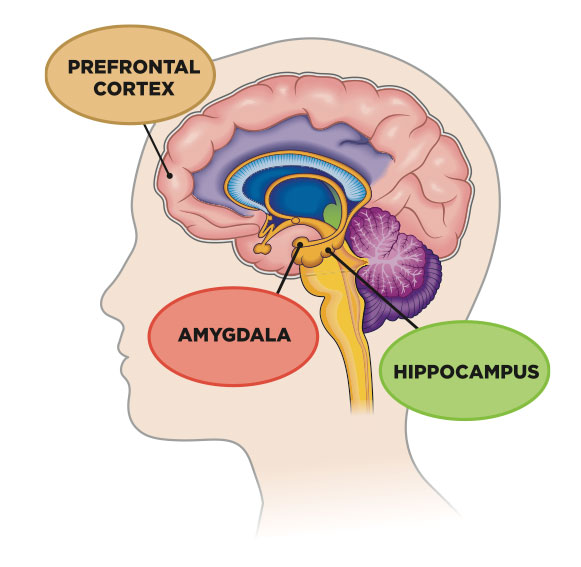Have you ever noticed how your brain just can’t seem to let go of traumatic memories or experience? It’s like you’re stuck in the past, constantly re-living moments that feel as fresh as if they happened yesterday. Maybe your heart races, or you feel unsafe even when there’s no reason to be. You might find yourself replaying those events over and over in your head, unable to make sense of the disjointed images, sounds, and emotions. Traumatic memories don’t just shake us emotionally—they mess with the very wiring of our brains.
But here’s the good news: while trauma can hijack your brain, you can take back control. It’s possible to process these overwhelming memories, heal from them, and start living in the present again. In this post, I’ll walk you through how trauma affects your brain and why processing those traumatic memories is so important for healing.
The Brain’s Built-In Recovery System
Let’s start with something pretty amazing: our brains are naturally designed to recover from stress. When we go through something tough—whether it’s an argument, a tough day at work, or even a small setback—the brain does its thing: it processes the event and helps us move on. For many of us, this process works just fine. The distress fades, and we move forward.
But when something more intense happens—when trauma strikes—our brain’s recovery system can get overwhelmed. Trauma is so big that it can lock the brain in a heightened state of stress, making it hard to move past it. Instead of processing it and moving on, we start to re-live the traumatic memories over and over again. It’s like being stuck in a loop.
This is where trauma therapy comes in. It’s about helping you break that loop, process the memories, and let your brain heal so it can go back to functioning properly. But before we dive into how therapy can help, let’s talk about how trauma changes the brain.
How Traumatic Memories Affect the Brain
Trauma doesn’t just sit in our memory banks like any old event. It rewires the way our brain works. There are three key areas of the brain that are affected when traumatic memories form: the amygdala, the hippocampus, and the prefrontal cortex. Let’s break down each of these.

Amygdala: The Brain’s Alarm System
The amygdala is like the brain’s security system. It’s the part of the brain that detects danger and sends out the “fight-or-flight” signal when we’re faced with a threat. When we experience trauma, the amygdala goes into overdrive. This means your brain is stuck in a constant state of alarm, even when you’re not actually in danger.
Imagine living every day like you’re always on high alert—your body tensed, your heart racing, waiting for the next threat. That’s what happens when trauma takes over. The amygdala is firing non-stop, making you feel anxious, unsafe, and overwhelmed—even in everyday situations that should feel calm.
Hippocampus: The Memory Organizer
Next up is the hippocampus—the brain’s memory organizer. This part of the brain helps us sort through what’s happening right now and what happened in the past. It keeps our memories organized and in the right timeline. But when trauma strikes, the hippocampus can’t do its job properly.
Instead of organizing the trauma into a neat memory you can look back on, it becomes jumbled and fragmented. It’s like your brain can’t make sense of what happened, so the memory is stored as a series of disconnected images, sounds, and emotions. This is why traumatic memories can feel so intense—because they don’t behave like regular memories. It’s like they’re happening all over again, right in the present.
Prefrontal Cortex: The Thinking Brain
The prefrontal cortex is the brain’s thinking and decision-making center. It helps us process information logically, manage our emotions, and make decisions. When we’re dealing with trauma, however, this part of the brain becomes weakened. It’s like the “thinking brain” gets turned off, and the emotional brain takes over.
This means you might struggle to assess situations clearly, make rational decisions, or control your emotional responses. The trauma memories are so powerful that they override your ability to think logically. This is why you may react instinctively, without fully understanding why you’re feeling the way you do.
Why Traumatic Memories Are Different
Here’s the thing: not all memories are created equal, especially when it comes to traumatic memories. Your brain stores regular memories in an organized way, which makes them easy to recall and put into context. But traumatic memories are different—they don’t follow the same rules.
Normal Memories:
- Stored as complete stories that make sense.
- You can choose when to bring them up or put them away.
- They feel like something that happened in the past.
Traumatic Memories:
- Stored as fragmented, disjointed pieces—flashes of images, sounds, smells, and emotions.
- They can come up unexpectedly and feel overwhelming, like you’re re-living the trauma.
- They feel like they’re happening right now, in the present.
It’s this fragmented nature of traumatic memories that makes them so hard to deal with. Unlike other memories that are organized and easily understood, traumatic memories don’t behave like normal memories—they keep us stuck in the past.
Why Do We Need to Process Traumatic Memories?
It’s completely understandable to want to avoid reliving traumatic memories. Who wants to rehash the worst moments of their life, right? But avoiding trauma doesn’t make it go away. In fact, it often keeps us stuck in the past, unable to move forward.
Processing traumatic memories is key to healing. It helps your brain organize those memories and put them in their proper place in the past, so they don’t have the power to control your present. It’s not an easy process, but the benefits are worth it. Here’s why processing trauma is so important:
You’ll Feel Calmer
The more you process your traumatic memories, the less power they have over you. Working through the emotions tied to the trauma makes the memories less intense. Over time, you’ll find that you’re less on edge, less triggered, and more at peace.
You’ll Regain Control
When trauma takes over, it can feel like your life is being run by those intrusive memories. Therapy helps you take back control. You’ll learn how to manage your triggers and emotions, which gives you the power to respond to your memories—rather than let them control you.
You’ll Grow Stronger
It may feel impossible to heal from trauma, but processing those memories can help you rediscover your strength. Trauma can leave us feeling broken, but therapy helps you rebuild your self-worth. You’ll begin to see how resilient you truly are and start rebuilding the life you want.
The Chocolate Factory Metaphor: How Processing Traumatic Memories Works
Think of your brain as a chocolate factory:
Normal Memories: A smoothly running factory where everything comes together to create a finished product.
Traumatic Memories: The factory’s mixing machine breaks down, causing emotions, images, and sounds to become jumbled, resulting in a messy, disorganized memory.
Processing traumatic memories is like fixing that broken factory—breaking down the trauma into manageable parts until everything makes sense again. This helps the memory become more organized, less overwhelming, and easier to live with.
This metaphor, from trauma specialist David Trickey and illustrated by Graham Ogilvie, shows how working through trauma can help restore balance. The visuals below may help clarify this process.



Summary
Processing traumatic memories is tough, but it’s also incredibly empowering. If you’re stuck in the past, constantly re-living painful moments, therapy can help you break free. With the right support, you can heal from the inside out—taking back control of your memories and your life.
If you’re ready to take the first step, reach out to a trauma specialist. With the right help, you can rebuild your sense of peace, strength, and self-worth—starting today.
You are also welcome to contact me if I might be able to support you as you journey forward.

